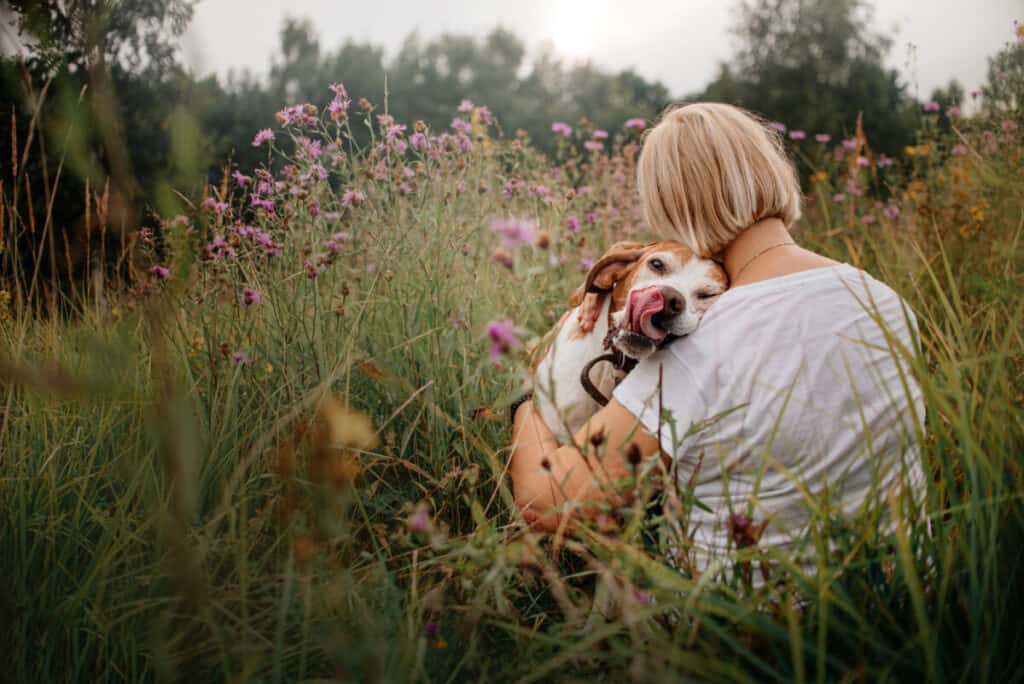
We constantly worry about our physical health, but pet owners know that having a cat or dog means you’re constantly concerned for their physical health as well. When euthanasia becomes a real possibility, you will need to consider how and when to do it. This is a decision that shouldn’t be made lightly.
A dog who is struggling with heart problems should be euthanized when they have become completely lethargic. Usually, when a dog is sick enough, it will stop eating and drinking and won’t play around or desire to go outside anymore. This is the time when humane euthanasia should be considered.
This is not a fun thing to think about, but you should make sure not to let your judgment become clouded due to how much you love your canine. Euthanasia may seem horrible but in truth, if your pet is sick enough, it will become an act of mercy. So, let’s talk about what you need to look for when you’re getting ready to say goodbye to your dog.
Looking for Symptoms
The first thing that needs to be done is to watch out for the symptoms of heart problems, heart failure specifically. After a little while, these won’t be too difficult to diagnose, so make sure you’re watching very carefully. Once you have spotted a few of these, you’ll need to get your dog in to see a vet as soon as possible.
The first thing you’ll need to watch out for is the coughing. Dogs will sometimes hack and cough right before they throw up. If they start doing that a lot, there might be something wrong that should be looked into. In addition, they could start coughing up foam which may sometimes have blood in it. That is an immediate indication of your needing to get them some medical attention.
You might start to notice major changes in your dog’s energy levels as well. There might be times when they should be up and about and they seem completely lethargic. There might also be other times when they need to be settling down (at bedtime, for example) and they can’t seem to stop pacing around and getting agitated.
Your dog may eventually get so exhausted that he or she collapses at odd moments. This is particularly concerning since it shows extreme levels of exhaustion and illness. If this happens repeatedly, you should probably start thinking about making a trip to a vet. You should also carefully monitor your dog’s eating patterns. Make sure they’re eating regularly and eating well.
Treatments to Use
If you start to notice any of those symptoms manifesting in your pet’s behavior, get them to the vet before waiting too long. If and when you’ve gotten a diagnosis, the next step is deciding how to proceed. There are plenty of treatments out there that your vet might recommend. What is prescribed will likely be determined by your dog’s particular circumstances.
Your vet might prescribe a few supplements that will both help the heart to pump better and to prevent the quick buildup of fluid in the dog’s lungs. These should be administered very carefully and exactly as your vet has directed. Misuse of the supplements/medications could lead to further complications.
Your vet may ask you to make changes in your dog’s diet. Often, this means decreasing salt in your dog’s diet so the fluid buildup in your dog’s body will slow or even start to decrease. This will either need to be vet-recommended or sometimes even prescribed. Speak with your vet at length about it.
You may also be able to submit your dog for surgery. This could either be surgery to drain the fluid from the lungs or surgery to insert a pacemaker into your dog’s heart which could help with its heart issues. Surgery can be something of a risk, depending on the circumstances. You know your dog better than anybody else so when you make this decision, make it carefully.
When Should You Consider Euthanasia?
Yes, there are plenty of treatments out there that can be utilized. However, if your dog is old enough and sick enough, you may have to consider that treatment is not going to be enough. There may come a time when you need to consider the unhappy possibility of needing to euthanize your dog for their own good. But how do you know when the time is right?
When your dog starts showing symptoms, it’s not immediately necessary to jump to euthanization. however, there will come a time after those symptoms start to show that you’ll know the time for treatments has passed. It’s difficult sometimes to know when the time is right because your judgment is clouded by your love for your dog.
You know your dog better than anyone else does, as mentioned earlier. This means you’ll know better than anybody else when to decide on euthanasia as the final answer. Usually, your dog will let you know they’re ready for it through their behavior.

When a dog is ready to die, it will typically stop eating, drinking, and even completely stop moving around. It will not ever be willing to play with you and it might even turn its nose up at treats. It will almost seem like your dog knows they’re sick and they have officially decided that it’s time to give up the fight.
Again, you will be responsible for the final decision. If your dog refuses to eat or drink or do anything that might make life fun, then keeping them here is merely an act of prolonging their misery. If they’re not enjoying life anymore and they’re constantly sick and tired, then the best thing you can do is put them to sleep, quickly and painlessly.
Humane Euthanasia
This is not a happy decision to have to make, but it’s one you will need to face. The main thing to start considering is how you’re going to do it. You can have the vet take care of it for you, you can do it yourself, or you can call a crematory. Whatever happens at the end is completely up to you.
If you want, you can have a vet put your pet down for you. This could cost anywhere from $50-$100 depending on whether they do it at the veterinary office or your home. Usually, if you ask them to come to your home, it will cost you a little bit more. If it is done at the veterinary office, the vet will also likely take care of the body for you.
Cremation is a popular option for those who have lost pets because it’s an easy way to remember and memorialize your pet. You can keep their ashes in a special place inside your house or somewhere else that holds meaning for you. If cremation is the route you choose to take, you can either have a vet make all the preparations for you, or you can call a crematory and have them take care of it. Either way, this might cost you even more than just having a vet do it for you.
Another way is to carry out the euthanization yourself via shooting. Humane shooting is the cheapest way to go (it’s free) but it’s not the easiest. If a humane shooting is how you want to do it, you will either need to have an experienced friend carry it out for you or make sure you are in an ok place emotionally to do it yourself.
You’ll need to know exactly how to make the shot because a misplaced shot could cause unnecessary pain and suffering. To make a good shot, you’ll need to place your gun about an inch and a half away from the dog’s head. This will ensure that the bullet has a direct line to the brain. Off-center the gun so the bullet hits the actual brain and not the bony ridge in the center of the dog’s skull.
Shooting may seem excessive or extreme, but the truth is that if you do it correctly, the brain and tissue will be damaged so quickly that your dog will essentially be unconscious when it dies. This means they’ll have a very painless and calm passage out of this life, so you don’t need to worry about their suffering.
Another reason humane shooting is a good option is that you’ll have the chance to bury your dog wherever you see fit (as long as you comply with the laws and regulations of your area). You can wrap your dog in clean towels, place them into a bin and bury them at least two feet deep.
Usually, this will be in a special place somewhere on your property, though you probably don’t want it to be too close to the house. This way, you can create a special little shrine or memorial to your canine that will help you to remember them fondly. It might make their passing seem a little more personal, rather than just handing them over to a vet.
Recovery for the Owner
Dogs nowadays are often like family members and it’s just as hard to lose them as it would be to lose a close friend or relative. Your dog has likely been a huge part of your life up to this point and having them suddenly gone is going to be a big change. Suffice it to say, you’re going to need to do some careful evaluating and taking care of yourself once your dog has passed away.
Know first that it’s okay to be sad. Dogs make great companions and friends to have around. They comfort you when you’re sad and are always happy to see you when you come home after a long day. So, if you’re feeling a large amount of sadness, that is perfectly normal. Allow yourself to grieve for a little while.
However, you should not allow yourself to be stuck in a mournful mindset for longer than it’s healthy to be so. It’s important to get back up and start doing things that will help you heal and take your mind off your pain a little bit. You can start by going out and talking it out.

Often when a person dies, their close friends and family will find comfort in talking about them and the life they had. This works with pets too. Find a close friend or relative you trust and open up to them about how you’re feeling. This could significantly improve your mindset and make coping with something like this a little bit easier.
You should also get up and get out! Social events are typically designed to raise the spirits and getting involved could seriously raise yours. Round up a few of your friends and go out for dinner then go catch a movie. Go for a walk and have a picnic. Go visit a museum, art exhibit, or watch a play.
If you’re not up for something that big, just have some people over for a cozy little game night. The bottom line is, you shouldn’t cut people out of your life. The people who know and love you the best are willing to support you through whatever it is you’re struggling with.
It’s also important to shake up your lifestyle and routine a little bit. When your dog was around, you had someone extra to feed, clean up after, and play with. Now that they’re not there anymore, you’ll probably have a good chunk of extra time on your hands. You might be tempted to turn on the TV and let thoughts of your pet consume you until you’re just depressed. That is the last thing you should do!
Take up some new hobbies and fill up your time with meaningful, productive activities. Maybe you could take the time to write to or call some people you haven’t talked with for a while. This kind of reconnection could do wonders for and greatly rejuvenate your mind and heart.
